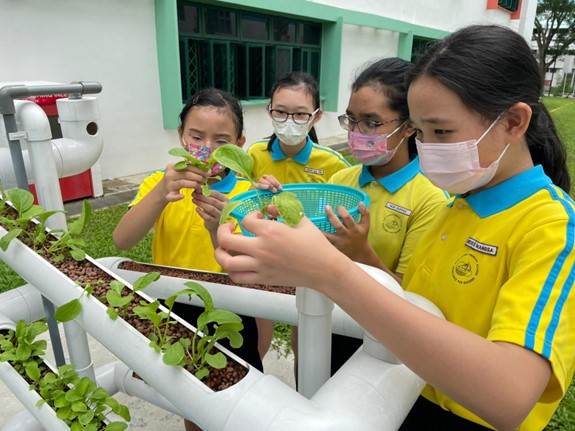Addressing climate change: No implementation without education
10 NOV 2022 | by Professor Lim Sun Sun

(Photo credit: East Spring Primary School)
Without long-term investment in education on the environment, pledges to address climate change will not translate into concrete action or sustainable results.
With COP27 billed and steered by host country Egypt as the ‘implementation COP’, the world watches with bated breath as to whether all the pledges signed by participating countries will transit from words to action. Opened on 6 November 2022 in Sharm el-Sheikh, the United Nations Climate Change Conference COP 27 has the principal aim of realising the complete implementation of the Paris Agreement.
In his opening address, UN Climate Change Executive Secretary Simon Stiell declared that “COP27 sets out a new direction for a new era of implementation…to drive greater climate progress — and accountability for that progress.” The stakes for successful implementation are high indeed. A sobering report by the UN Climate Change released ahead of COP27 presented compelling evidence that even though countries are seeing modest success in lowering global greenhouse gas emissions, these efforts are too feeble to limit global temperature rise to 1.5 degrees Celsius by the end of the century.
So overwhelming is the current climate crisis that the solution lies well beyond the international cast of bureaucrats rubbing shoulders in Egypt. To ensure that our planet has a chance of recovering from its present state of abuse and exploitation, we must focus our energies not just on the implementation of pledges that advance the goal of net-zero emissions. For more sustainable long-term change, we must do more to imbue change makers of the future with a sense of care for the environment. More strategic efforts must be mounted to build the environmental DNA of today’s children so that they have a sense of ownership over their natural milieu and the role they can play to protect it.
To be sure, children across the world acutely feel the adverse impacts of environmental degradation when their homes and communities are threatened by natural disasters, droughts or pollution. But rather than shielding young people from these grim realities, we need to educate them on the actions they can take, big or small, to reduce environmental damage. Instead of feeling defeated by the bleak circumstances therefore, children will feel empowered by their potential to effect positive change. Programmes like the Singapore Environment Council’s School Green Awards (SGA) can help to promote environmental awareness and stewardship in children. Rather than being a simple campaign with catchy slogans and cute mascots, the SGA challenges students to develop original environmental programmes within their schools such as to promote recycling, nurture community gardens and enhance community engagement for environmental action. After all, there is nothing more effective than learning by doing.
Inculcating a Natural Love for the Environment
Through educational efforts such as the SGA, we can inculcate in today’s children a natural love for the environment and an instinctive sense of justice for righting environmental wrongs. In the long run, education will engender more sustainable and enduring benefits to the environment than a narrow focus on policy implementations.
Creative Pedagogical Interventions
Governments, corporations and civic society should exert greater efforts in educating young people on environmentalism to ensure the future of our planet. More creative pedagogical interventions can be introduced to heighten their sense of ownership and their potential to transform the environment for the better.

Professor Lim Sun Sun is a Professor of Communication and Technology at the Singapore University of Technology and Design, and a member of the SEC Board of Directors.